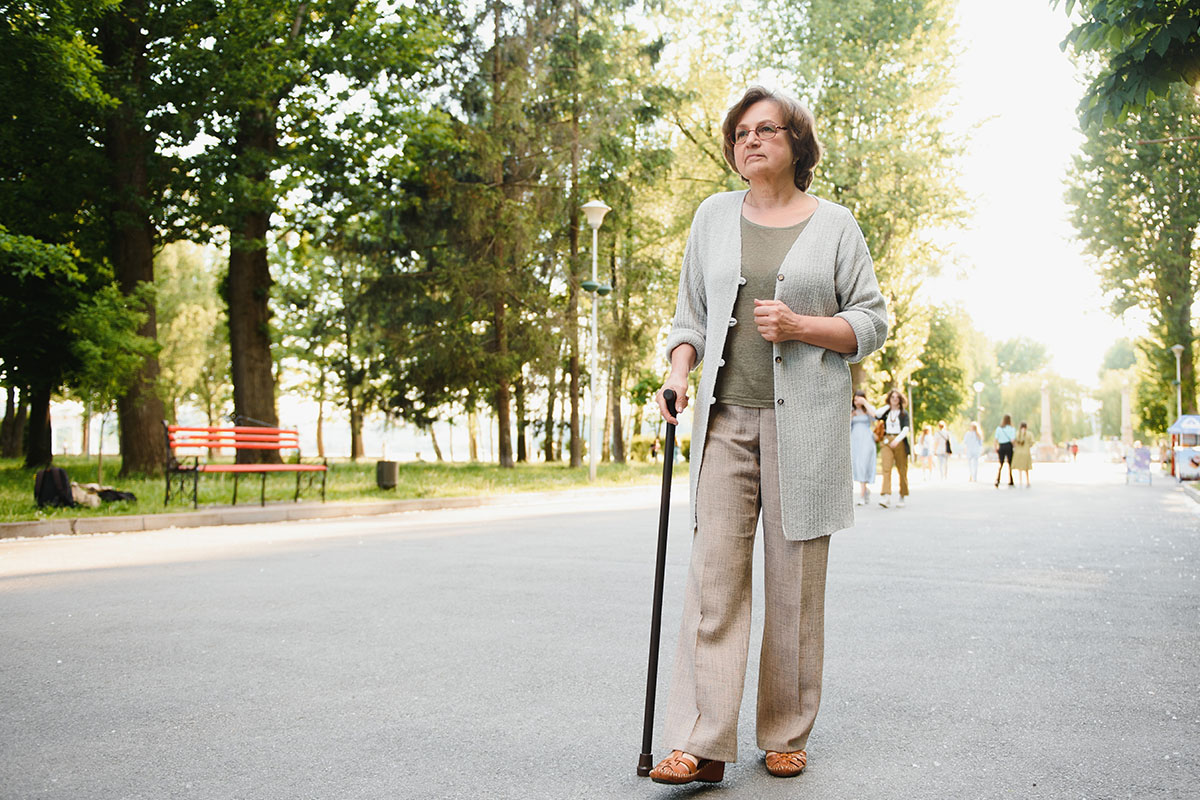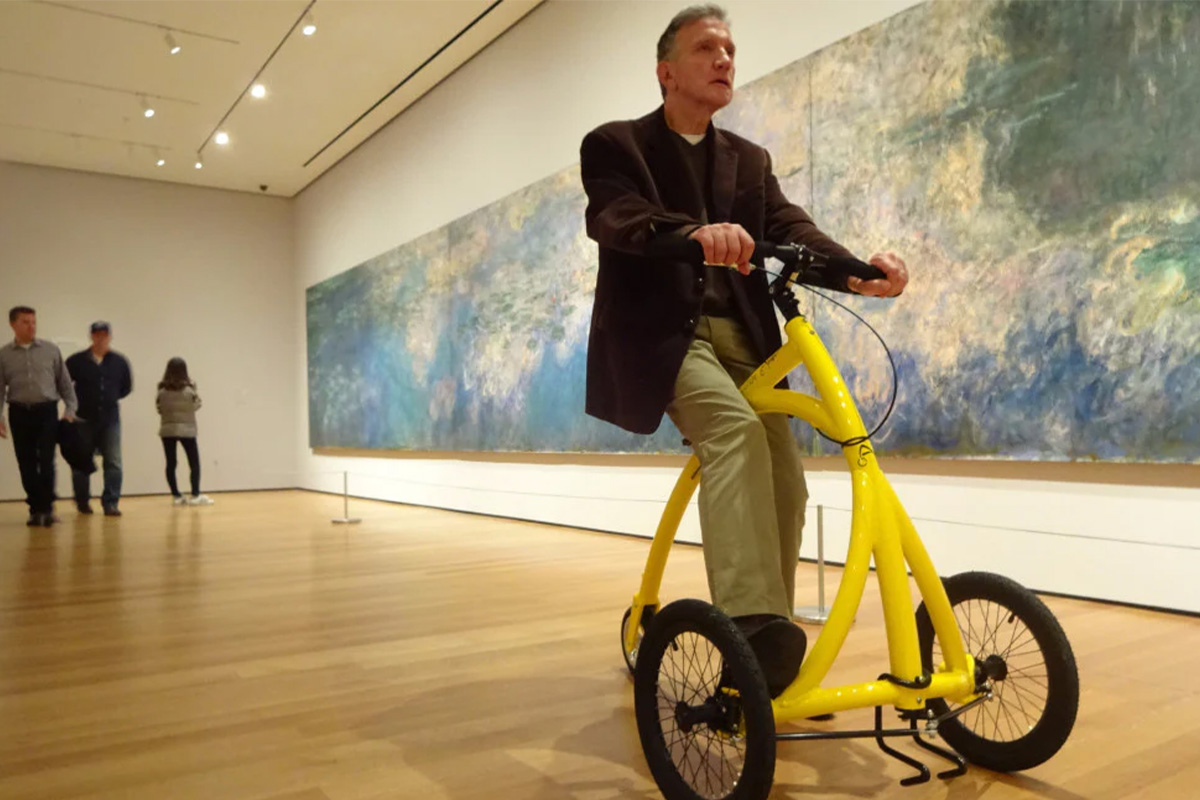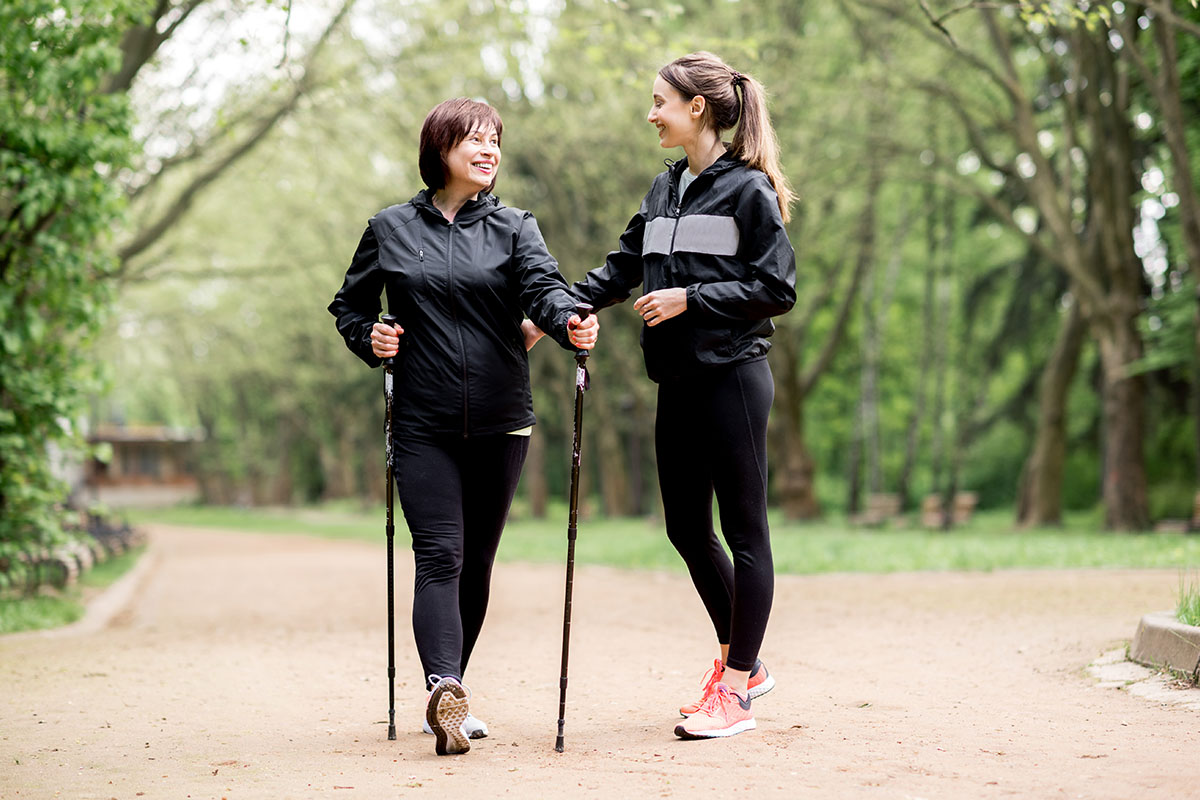Parkinson’s disease (PD) is a progressive neurological disorder that predominantly affects motor skills, leading to significant challenges in daily activities, including walking.
As the disease progresses, some people may find mobility aids to be especially helpful for maintaining independence and safety.
While adaptive devices may be necessary for some people, not every person with PD will require these tools. Each person’s journey with incorporating walking aids is dependent on their unique circumstances, and choosing to use a walking aid is a personal choice.
Let’s explore the varying elements of walking aids, including how Parkinson’s impacts mobility and the top adaptive devices for people with PD.
Making the Choice to Use Walking Aids

Jimmy Burns, PCLA Community Member
At PCLA, we understand that making the choice to use a walking aid can be difficult and stir up complicated emotions.
On the one hand, utilizing a walking aid may feel like a submission to Parkinson’s—tangible evidence of the disease’s impact. In reality, these tools significantly expand the options for people living with PD and contribute to prolonged independence.
Here’s an excerpt from Jimmy Burns, a member of the PCLA community, on his own experience with incorporating walking aids into his routine:
“The first time or two I used the wheelchair service at the airport, I fought it,” said Jimmy. “I felt like I’d have to ask for permission to go get my peanut M&M’s. But that’s just not true.”
On the contrary, Jimmy found the attendants were there to help him. They even come with the added bonus of knowing the cleanest restrooms and shortcuts to amenities, and go so far as to transport you directly to your gate.
“Your ‘driver’ will know exactly where to go and even help you get through security,” Jimmy added.
“At first, using the wheelchair jolted me out of my denial. I’m sitting in a wheelchair. I do have PD, don’t I? But after making a few more trips, I now see that’s okay,” he said.
“I’m still me! I still can travel anywhere I want to go and I am safe! No falling! Safe for me and my fellow traveler’s safety too!”
When you get to your destination, Jimmy encourages you to “go ahead and pull your cane out.”
“I hated it until I realized I didn’t have the mobility to walk without assistance. Falling a few times without the assistance of a cane will help bring that point home. And a plus, when you use your cane, and people see it, they will give you space without saying a word—just smile.”
Coming around to using walking aids wasn’t an easy journey for Jimmy, but he’s found peace in making this choice for his own safety and well-being.
How Parkinson’s Impacts Mobility

Parkinson’s disease often leads to a variety of mobility issues due to symptoms such as bradykinesia (slowness of movement), rigidity, and tremors.
As PD progresses, people may also experience decreased stride length and speed, making it difficult to initiate and maintain a steady pace. Balance also becomes a concern, increasing the risk of falls.
These motor symptoms can be compounded by the fear of falling itself, which may further limit a person’s activity level and contribute to a decreased quality of life.
The deterioration in mobility can vary significantly between individuals. Some may develop a shuffling gait, while others might encounter freezing of gait—a sudden and temporary inability to move, particularly pronounced when starting to walk or turning.
These challenges can make simple tasks like getting dressed, crossing a room, or walking in crowded places daunting and hazardous.
Fortunately, there are various walking aids to help alleviate the impact of PD on mobility. You’ll find great options tailored to all different stages of Parkinson’s, with some even explicitly designed to meet the unique needs of people with PD.
Walking Aids for Parkinson’s Disease

Recognizing the challenges faced by those with PD, a variety of walking aids have been developed to assist with mobility and enhance safety.
Check out our top recommendations for walking aids for individuals with Parkinson’s disease:
Walking Sticks
Walking sticks provide essential support for balance and are particularly useful for those in the earlier stages of Parkinson’s who require minimal assistance.
They can help increase confidence in mobility by offering an additional point of contact with the ground, enhancing stability, and reducing fatigue.
Canes
The use of a cane, specifically a single-point cane or laser cane, can be a game changer for many living with PD. Both are lightweight, easy to handle, and adaptable to various settings, making them practical for everyday use.
Single-Point Cane
Single-point canes provide stability and balance, helping to mitigate common Parkinson’s symptoms like shuffling gait and stiffness.
By offering an additional point of contact with the ground, these canes distribute weight more evenly and provide vital support on one side of the body. This is particularly useful for preventing falls and increasing the user’s confidence to walk in varied environments.
Laser Cane
Laser canes build on the benefits of traditional canes by incorporating a visual aid—a laser line projected onto the floor. This feature is designed to combat freezing of gait, a symptom where people with PD temporarily feel unable to move their feet.
The laser line acts as a visual cue that helps trigger movement, enabling users to initiate and continue walking more smoothly and with greater assurance.
The Alinker

Photo credit: The Alinker
The Alinker is an innovative, non-motorized walking bike designed for those who want to maintain an active lifestyle despite mobility challenges. It supports the user in a standing position, enabling them to remain at eye level with others, which is crucial for social interactions.
This device is beneficial for those who can still use their legs but need substantial support for balance and endurance.
Learn more about the Alinker here!
Parkinson Rollator Walker
Specially designed for people living with PD, the Parkinson rollator walker includes features like laser lights and auditory cues. These are particularly effective for overcoming freezing episodes, providing stimuli that help the user initiate and continue movement.
The walker also comes with additional support for posture and a seat for resting, making it a versatile choice for varying levels of mobility impairment.
Learn more about the Parkinson Rollator Walker here!
U-Step Neuro Walker
The U-Step Neuro Walker is specifically engineered to increase stability with a U-shaped base surrounding the user. This design helps prevent falls by providing support in all directions.
Its unique braking system, which activates when the handle is released, ensures additional safety and is ideal for those with tremors or sudden loss of muscle control.
Learn more about the U-Step Neuro Walker here!
Breaking the Stigma of Mobility Aids

Using walking aids can significantly improve the quality of life for those living with Parkinson’s.
These enhance physical mobility and boost psychological well-being by fostering greater independence and reducing the fear of falling. Embracing these tools can be a positive step towards managing the symptoms of PD and maintaining an active, fulfilling life.
For many, the decision to use a walking aid is a step towards reclaiming independence rather than a sign of surrender. With proper support, individuals with Parkinson’s can continue to engage in their daily activities more safely and with greater confidence.
If you or a loved one is navigating Parkinson’s, we encourage discussing these options with your healthcare provider to find the best fit for your needs and lifestyle.



0 Comments